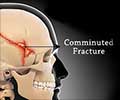Inca surgeons in ancient Peru had special skills that enabled them to treat head injuries by removing small portions of the skull, a new study has found.
According to a report in national Geographic, researchers from Southern Connecticut State University in New Haven, US, carried out the study.Around the ancient Inca capital of Cuzco, remains dating back to AD 1000 show that surgical techniques were standardized and perfected over time.
"The new findings show that Inca surgeons had developed a detailed knowledge of cranial anatomy," said lead author Valerie Verushko, of Southern Connecticut State University in New Haven. "These people were skilled surgeons," she added.
The surgical procedure-known as trepanation-was most often performed on adult men, likely to treat injuries suffered during combat, according to researchers.
Nearly all of the surgeries were performed either near the middle of the skull or on the left side-the regions most likely to be injured during combat with a right-handed opponent.
A similar procedure is performed today to relieve pressure caused by fluid buildup following severe head trauma.
Advertisement
The operations were conducted without the modern benefits of anesthesia and antibiotics, but medicinal plants were probably used, she added.
Advertisement
"These, along with maize beer, may have been used to alleviate some of the pain. Natural antiseptics such as balsam and saponins may have reduced the likelihood of infection following trepanation," she added.
Verushko and study co-author John Verano of Tulane University in New Orleans studied remains from 11 burial sites in Cuzco and the surrounding region.
Their survey found that trepanation was a remarkably common practice in the Inca capital. Of 411 skulls that were sufficiently well preserved to study, 66 had holes cut through the bone.
In one location, 21 of 59 skulls-over a third-had received trepanation.
While methods of trepanation varied over time, Inca surgeons eventually settled on a scraping technique to penetrate the skull without causing wider injury.
"The skull was slowly scraped away, resulting in a circular hole surrounded by a wider area of scraped bone," said Verushko.
According to Tiffiny Tung, an archaeologist at Vanderbilt University in Nashville, Tennessee, "This is the kind of richly detailed study that really gives us a sense of what life was like for ancient Andean populations."
"It's astounding that such a large percentage of the population underwent skull surgery and that so many survived," she added.
Source-ANI
RAS/L







